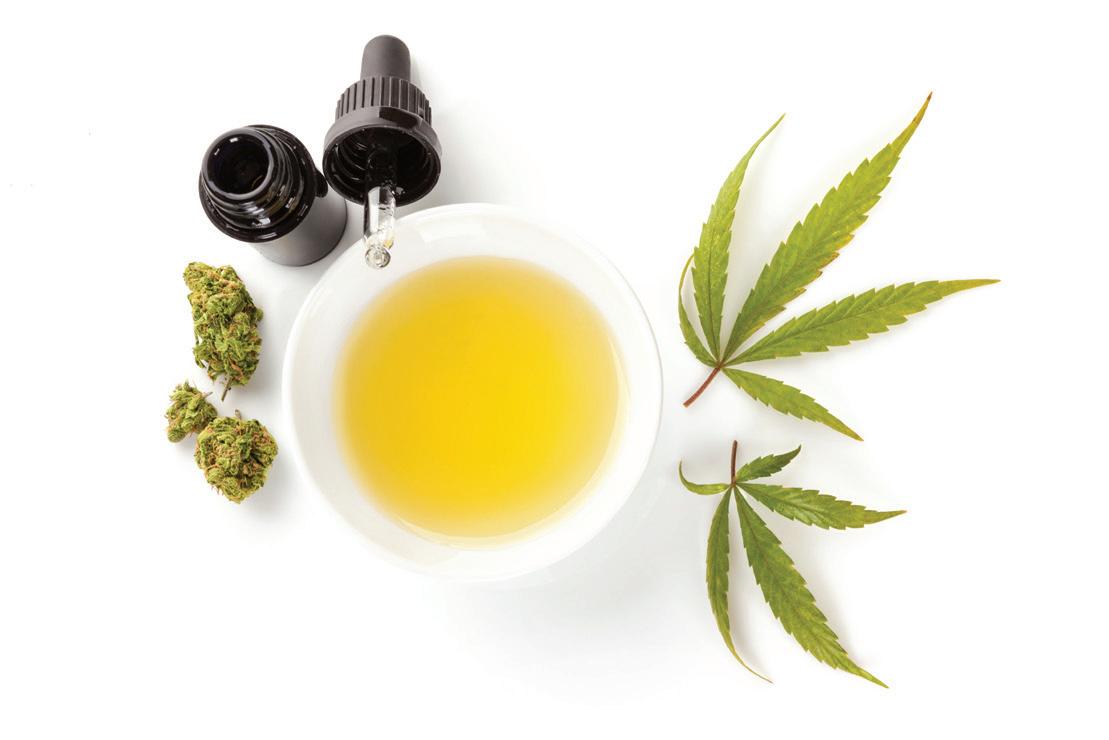
4 minute read
MEDICAL MINUTE WITH NURSE JORDAN

NURSE JORDAN
In this column, our readers have the opportunity to ask our staff nurse anything they want to know about using cannabis plant medicine. She will provide quick and concise answers to big questions. In this issue, we dive into why people age 65 and over are turning to cannabis. Read on as we explore some commonly asked questions about seniors using cannabis.
CANNABIS IS A KNOWN PAIN RELIEVER.

WHAT SPECIFIC AILMENTS CAN SENIORS USE CANNABIS FOR?
Before we talk ailments, let’s talk retirement. Generally speaking the senior population has extra time on their hands. One of the most amazing things about cannabis is its ability to enhance daily activities. The mundane becomes the enjoyable, all thanks to a plant. A common complaint for the aging population is pain, 1 and cannabis is a known pain reliever. Relief from conditions like arthritis may be found from a cannabis topical and a tincture taken by mouth. Anxiety and depression can also be a part of the aging process. Cannabinoids such as THC, CBD, and CBC (cannabichomonene) may contribute to the mood-elevating effects of cannabis. 2
AS I CONTINUE TO AGE, WHAT IS THE BEST WAY FOR ME TO CONSUME CANNABIS? Not all seniors are savvy smokers, nor do they want to be. Smoking cannabis provides the quickest response, however, it also fades the fastest. Experimenting with edibles and tinctures may provide the most long-lasting effects. It is important to try different methods and cultivars. Keep a journal to document everything you try. Include the time of day, what you try, amount you take, and effects felt after how much time has elapsed. This way, if you enjoy the feeling of a particular product you will know what it was and how much you took, so you can try to duplicate the effect.
ARE THERE ANY RISKS TO ANY OF MY PHARMACEUTICAL MEDICATIONS?
Because the majority of medications are metabolized 3 by the liver and the same enzymes that break down pharmaceuticals also break down CBD, many medications may not be able to reach their full potential if using CBD. It is important to be honest with your doctor about your desire to use cannabis and to verify if any of the medications you are on can interact with CBD or THC.
There are a few pharmaceutical medications that are causing interactions with cannabis. One of those medicines is Coumadin or Warfarin. 4 This is a medication to thin the blood. It is contraindicated because it increases the risk of bleeding. Another medicine commonly used for asthma is a bronchodilator called Theophylline. 4 Some research has shown cannabis interferes with the effectiveness of the drug. There are also some interactions with CBD 5 and calcium channel blockers and beta blockers so cardiac patients should be sure to speak with their doctor.
WHERE CAN I PURCHASE CANNABIS?
This answer is dependent on where you are. As of late fall 2019, there are 33 states with medical marijuana and 11 states with recreational cannabis available. Several countries have now adopted cannabis legislation as well. If you live in a legal or medical location then a quick search will get you started. If you are not sure about the laws where you live, visit the website for NORML 6 - the National Organization for the Reform of Marijuana Laws. They are the longest standing consumer advocacy group in the nation. Click the tab that says “States,” and then click on your state.
If you are in a medical state, first, you will need to register as a medical patient using a state approved physician. Chances are your primary care physician can not write this recommendation. Federally, cannabis remains a Schedule 1 substance so it is not possible for doctors to write “prescriptions” for cannabis because a Schedule 1 can not be prescribed. Doctors receive special certification from the state they live in and can then write “recommendations” to patients. When you are at the office obtaining your card, ask them for referrals to local dispensaries where you can then purchase your cannabis products. If you are in a legal state all you need to do is search online, “dispensaries near me” and you will find the closest dispensary to your current location. Simply show your ID at the door and be sure to ask questions to your “budtenders,” (budtenders are dispensary staff behind the counter who assist you with your purchase). They are there to help guide your experience.
DO YOU HAVE QUESTIONS FOR NURSE JORDAN? Please submit any questions to info@getgramnow.com Your question may be published in an upcoming issue.
Sources: 1. https://www.ncbi.nlm.nih.gov/pubmed/28983880 “Cannabis and Cannabinoids for Chronic Pain.” Current Rheumatology Reports, November 2017 2. https://www.sciencedirect.com/science/article/pii/S0091305710000730 “Antidepressant-likeeffectofΔ9-tetrahydrocannabinol and othercannabinoidsisolated from CannabissativaL.” PharmacologyBiochemistry and Behavior . June 2010 3. https://www.huffpost.com/entry/cbd-medication-interaction_l_5c9271efe4b08c4fec336ff 2 “CBD May Possibly Interfere With Your Daily Medication” Julia Ries. March 21,2019 4. https://www.mdlinx.com/internal-medicine/article/4695 “Rx drugs that don’t mix with CBD, THC, and marijuana” John Murphy, MD Linx. October 9, 2019 5. https://doh.dc.gov/sites/default/files/dc/sites/doh/publication/attachments/Medical%20Ca nnabis%20Adverse%20Effects%20and%20Drug%20Interactions_0.pdf “Medical Cannabis Adverse Effects & Drug Interactions” Government of the District of Columbia, Department of Health 6. https://norml.org/states NORML, Working to Reform Marijuana Laws










